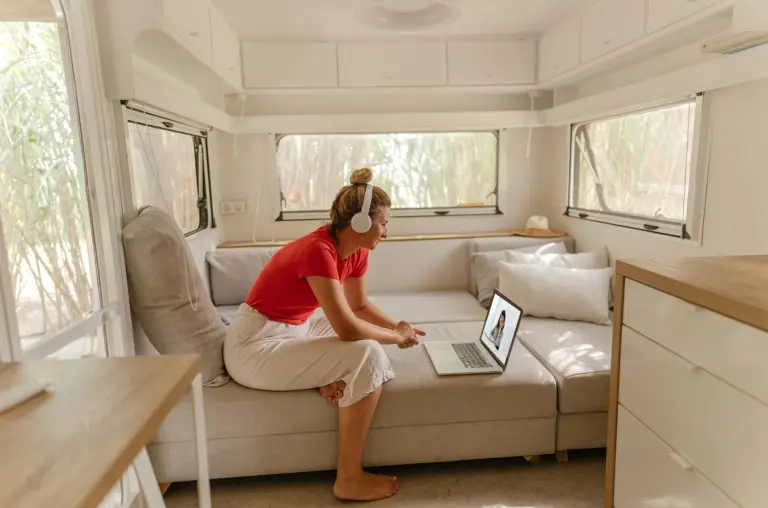Build a global team in minutes
Get expert helpYou’ve just had a hot-stone massage at your hotel, and you’re getting ready to tuck into a 32oz Ribeye (medium rare) when your phone buzzes. Then buzzes again. And again. You’ve got 32 Teams messages and someone needs you to hop on a call ‘just for a couple minutes.’ If this is you, you might be experiencing suboptimal work-life balance.
Work-life balance is more than just flexible schedules or remote work options (or ignoring that call when your steak is ready). Cultural attitudes toward time, policy frameworks surrounding leave and benefits, and lifestyle priorities greatly influence how different countries approach the balance between professional and personal life. From New Zealand’s emphasis on “life is for living” to Denmark’s famous hygge, these differences create distinct workforce expectations and values across global markets.
Research shows that employees with better work-life balance deliver superior results for their organizations. Balanced workers show increased creativity and problem-solving abilities while maintaining higher levels of focus and engagement. Companies employing a four-day workweek experience lower turnover rates and less absenteeism, as well as employees who report feeling happier and less stressed, according to studies.
Smart employers recognize that hiring global talent from countries with the best work-life balance offers significant strategic advantages. These employees typically bring with them healthy work habits and realistic expectations about sustainable productivity.
What makes a country work-life balanced?
The most balanced countries establish comprehensive frameworks that promote employee well-being through legislation, cultural norms, and benefit programs. Several key factors determine whether a country truly prioritizes work-life balance:
- Legal limits on working hours. Progressive countries establish maximum weekly hours and protect employees from excessive overtime demands. Finland’s Working Hours Act allows workers to adjust their start and end times by up to three hours, whereas Belgium has adopted a four-day workweek for federal civil servants.
- Paid leave policies. Robust vacation, parental, and sick leave create space for personal needs and family responsibilities. Finland offers 160 days of parental leave per parent, while Sweden provides up to 480 days of shared parental leave between parents.
- Access to flexible work arrangements. Modern work-life balance requires flexibility in both location and schedule. Portugal leads the way with laws that prevent after-hours contact and require employers to contribute to home office expenses.
- Cultural attitudes toward rest and productivity. Countries with a strong work-life balance reject the glorification of overwork in favor of a culture that prioritizes efficiency. Sweden’s concept of lagom (balance) and Costa Rica’s Pura Vida lifestyle demonstrate how cultural values shape workplace expectations.
- Public infrastructure supporting leisure and family life. Quality healthcare, education, and transportation systems reduce daily life burdens and create more time for personal pursuits. These services allow employees to focus on well-being rather than managing basic necessities.
Organizations like the OECD measure these factors through comprehensive indices, including the Better Life Index, which evaluates work-life balance alongside ten other dimensions of well-being. The World Happiness Report and various quality of living surveys provide additional benchmarks for comparing how different countries support employee satisfaction and life fulfillment.
Top 11 countries with the best work-life balance
The following countries have established comprehensive frameworks that support employees through progressive legislation, cultural values, and infrastructure investments. These nations demonstrate that prioritizing work-life balance creates more productive, engaged, and loyal workforces.
1. Netherlands
The Netherlands leads global work-life balance initiatives, boasting an average workweek of just 29 hours, one of the shortest in the world. Dutch law caps daily work at 12 hours, with a weekly maximum of 60 hours, although most employees work between 28 and 40 hours weekly.
“Under the Flexible Working Act, employees can request adjustments to their employment conditions,” says Anja Blijham, a Dutch attorney at GMW Law. “This law not only grants employees the right to request changes to their employment contract, but also provides rules on how an employer should handle such requests.”
Cultural attitudes in the Netherlands prioritize efficiency over hours worked, with Dutch employees focusing on task completion rather than time spent at desks. The nation’s exceptional digital infrastructure supports flexible work arrangements, as 98% of households have access to high-speed internet. Employers benefit from hiring Dutch talent because these professionals already have healthy work habits and realistic productivity expectations without the need for extensive work-life balance training.
2. Denmark
Denmark maintains a standard 37-hour workweek with legal protections that limit overtime to just 8 hours weekly or 150 hours annually. The country provides all employees with up to 25 days of paid vacation annually, and Danish culture strongly discourages working beyond standard hours. Only 1% of Danish employees work very long hours compared to the OECD average of 10%.
The Danish concept of hygge extends into workplace culture, emphasizing comfort, coziness, and work-life harmony over productivity at any cost. Remote work capabilities are well-established, supported by flexible work policies and strong digital infrastructure. Recruiting Danish talent give you professionals who prioritize sustainable work practices and have cultural expertise in creating balanced, productive team environments.
3. Sweden
Swedish workers enjoy some of the world’s most generous parental leave policies, with up to 480 days of shared leave between parents and over 25 days of annual vacation. The country’s Working Hours Act requires 11 consecutive hours of daily rest, while actual working hours average around 30 hours per week, despite a 40-hour standard. Sweden’s commitment to work-life balance shows in its annual work total of 1,441 hours per employee, which is 18% below the OECD average.
Sweden leads the globe in its adoption of remote work, with approximately one-third of its employees working from home and a robust digital infrastructure supporting flexible arrangements. Swedish work culture emphasizes efficiency and results over presenteeism, creating environments where employees feel trusted to manage their own productivity. Employers who hire Swedish talent benefit from professionals who understand sustainable work practices and can help establish similar balance-focused cultures within international teams.
4. Germany
Germany has some of Europe’s strongest protections for working hours. The daily limit of eight hours can be extended to 10 hours only when the weekly total remains below 48 hours. Most German employees work 36-40 hours weekly on a Monday-Friday schedule, while employers must guarantee at least 11 consecutive hours of rest between workdays. The country mandates a minimum of 20 working days of paid vacation annually, although most employment contracts provide for 25-30 days in total.
Germany’s cultural approach emphasizes efficiency within clearly defined boundaries rather than long hours for their own sake. The nation’s robust legal framework around overtime compensation and mandatory break periods reflects deep cultural respect for employee well-being. Employers hiring German talent benefit from professionals who understand sustainable productivity practices and have experience working within structured yet flexible environments that prioritize results over presenteeism.
5. Finland
Finland operates on a standard eight-hour workday, Monday through Friday, with regular lunch and coffee breaks built into the work culture. The country has maintained its position as the world’s happiest nation for eight consecutive years, largely due to its prioritization of work-life balance through decent working hours and ample opportunities for free time. Finnish workplace culture emphasizes trust, open communication, and the ability to work independently while knowing when to collaborate with team members.
Trust forms the foundation of Finnish work relationships, extending beyond transparency to include skilled, high-context communication that helps avoid interpersonal conflicts. Most Finnish managers prefer solving complex challenges rather than micromanaging routine tasks, creating autonomous work environments where employees take ownership of their responsibilities.
6. Norway
Norway demonstrates a superior work-life balance compared to EU averages, with only 13% of workers experiencing a high risk of burnout and fewer employees reporting work-related health hazards. The country’s cultural approach prioritizes downtime and personal restoration, resulting in lower rates of work-related exhaustion than most European nations. Norwegian work culture maintains clear boundaries between professional and personal time while supporting employee mental health and well-being.
The Norwegian model shows that respecting downtime actually enhances productivity rather than diminishing it. Cultural norms discourage overwork and instead promote sustainable work practices that prevent burnout before it occurs. Employers who hire Norwegian talent leverage professionals who understand the importance of rest and recovery, bringing established practices for maintaining high performance without sacrificing personal welfare.
7. Austria
Austria offers generous leave policies with statutory vacation minimums that often exceed 25 days annually, complemented by comprehensive healthcare systems that alleviate personal stress burdens. The country’s approach to work-life balance combines Central European efficiency with robust social safety nets that allow employees to focus on their professional responsibilities without worrying about basic life necessities. Austrian employment laws include robust protections for working hours and mandatory rest periods similar to those in other German-speaking countries.
Cultural attitudes in Austria emphasize quality of life alongside professional achievement, creating work environments where employees feel supported both professionally and personally. The nation’s excellent healthcare infrastructure and family support systems enable workers to maintain better work-life integration. Recruiting Austrian talent provides employers with professionals who have balanced perspectives on productivity and understand how supportive systems contribute to sustained high performance.
8. France
France pioneered the 35-hour workweek and established the legal “right to disconnect” that prevents employers from contacting employees outside of work hours. French labor law provides a minimum of five weeks of paid vacation annually, with many employees receiving additional days through collective bargaining agreements. The country’s approach balances productivity with personal time through structured work schedules and legal protections against overtime abuse.
French workplace culture emphasizes the separation between professional and personal life, with clear expectations that work ends at designated times. The “right to disconnect” law reflects cultural values that prioritize personal time and mental health over constant availability.
According to employment attorneys Julien Haure and Agathe Vandenbroucke at Mayer Brown, “There are various approaches to the right to disconnect across jurisdictions. For example, while some jurisdictions rely on codes of practice, others address the right to disconnect via legislation, or restrict the right to teleworkers/remote workers only.” Global employers should exercise caution and consult experts in French employment law or work with a qualified employer of record in France.
9. Spain
Spain has embraced flexible work arrangements, including hybrid work models and siesta-friendly schedules that align with natural energy rhythms throughout the day. The country’s standard workweek is 40 hours, with a minimum of 22 paid working days off, including vacation. However, many Spanish companies offer additional flexibility regarding lunch breaks and afternoon schedules. Spanish work culture accommodates longer midday breaks that allow employees to recharge and spend time with family.
The traditional siesta culture has evolved into modern flexibility that recognizes different productivity patterns throughout the day rather than rigid 9-to-5 schedules. Spanish employers are increasingly offering flexible hours that prioritize work-life integration over strict time-based attendance.
10. Australia
Australian law establishes a 38-hour standard workweek with strong overtime protections and mandatory rest breaks between shifts. The country provides four weeks of paid annual leave plus additional public holidays, with many employers offering flexibility in how employees take their time off. Australia’s Fair Work Act includes provisions for flexible work arrangements and protection from excessive working hours.
Australian workplace culture emphasizes wellness and the integration of an outdoor lifestyle, with many companies supporting employee health through fitness programs and flexible schedules. The country’s focus on work-life balance extends to mental health support and recognition that sustainable productivity requires personal time for restoration.
11. New Zealand
New Zealand leads in remote work adoption and experimenting with a four-day workweek. Many companies have successfully implemented compressed schedules without reducing pay or productivity. The country’s flexible work culture emerged from geographic isolation, which has evolved into sophisticated remote collaboration practices. New Zealand’s approach combines traditional work-life balance with innovative scheduling that maximizes both efficiency and personal time.
The nation’s “life is for living” cultural attitude creates work environments where employees feel supported in pursuing personal interests alongside professional goals. New Zealand’s successful trials in a four-day workweek demonstrate that reduced hours can actually increase productivity and employee satisfaction. New Zealand’s talent pool offers one of the best countries for hiring remote workers and innovative approaches to work-life integration.
How Pebl supports work-life balance
It should be clear now that different countries have massively different views on work-life balance. Meeting the expectations of your employees—from Norway to New Zealand—is the only way to retain and attract the best talent. Pebl’s Employer of Record service allows you to achieve those expectations by operating in 185+ countries worldwide. Let us be the legal employer and let our country-specific cultural experts handle working hour regulations, vacation laws, benefits, and everything else.
Let us help you build a global workforce rooted in balance and performance. Contact us to learn more.
This information does not, and is not intended to, constitute legal or tax advice and is for general informational purposes only. The intent of this document is solely to provide general and preliminary information for private use. Do not rely on it as an alternative to legal, financial, taxation, or accountancy advice from an appropriately qualified professional. The content in this guide is provided “as is,” and no representations are made that the content is error-free.
© 2025 Pebl, LLC. All rights reserved.
Topic:
HR Strategies


